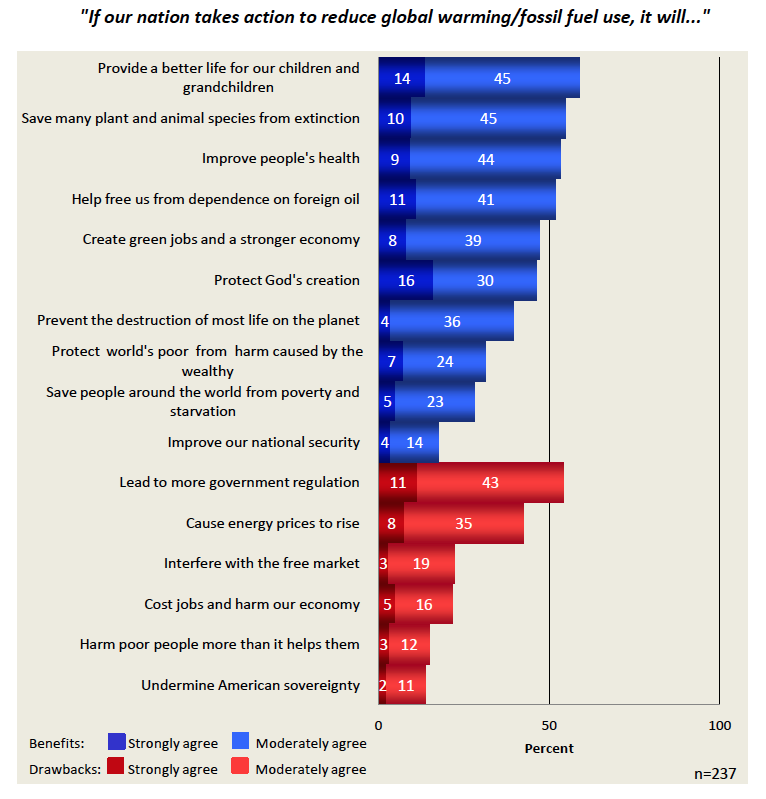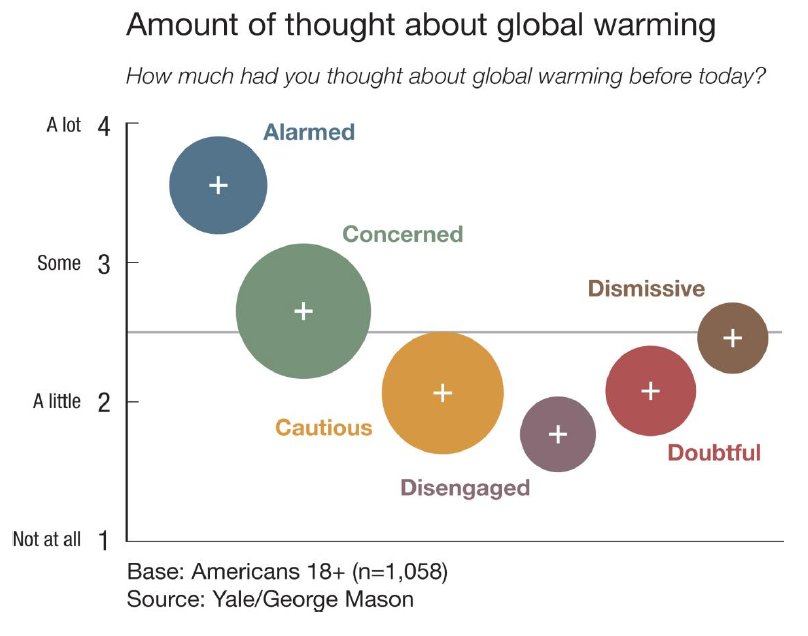A study by the Yale Project on Climate Change Communication and the George Mason University Center for Climate Change Communication
The Global Warming’s Six Americas study surveyed the American public about global warming beliefs, behaviors, and policy preferences regarding climate change. The results led them to classify citizens into six distinct groups and study changes in public opinion. The six groups: Alarmed, Concerned, Cautious, Disengaged, Doubtful, and Dismissive. Alarmed being the most engaged and motivated with the highest belief in global warming. Dismissive being the least.
The results indicated the largest groups were Alarmed and Concerned (over half of the population.) In 2010, Dismissive doubled to 16% of the population. The groups have been shifting and in 2012, the Disengaged, Doubtful, and Dismissive have declined and the Alarmed and Concerned are growing once again. Researchers attribute the changes to media coverage, political figures, and the recession.
Lately the American population is becoming more aware and motivated to actively work against climate change. Let’s talk about the specific groups and their characteristics. Below are results of how each group answered perceived benefits and costs of reducing fossil fuel use and global warming.
- Alarmed– The Alarmed group expects that by taking action against climate change, there will be many benefits and very few negative consequences. “Taking action to reduce global warming is seen as more likely to save plant and animal species from extinctions and provide a better life for our children and grandchildren than was taking action to reducing fossil fuel use.”
- Concerned– The Concerned group expects more negative consequences than the Alarmed group. They do not see taking action against climate change to be as effective as the Alarmed. “Nonetheless, approximately 8 out of 10 members of the Concerned anticipate that taking action will provide a better life for our children and grandchildren, save many plants and animal species from extinction, and improve people’s health; large majorities also believe it will help free us from dependence on foreign oil and create jobs.”
- Cautious– The Cautious group expects benefits from taking action, but their beliefs are “weakly held.” “The benefits they are most likely to strongly anticipate are protecting God’s creation (16%) and providing a better life for our children and grandchildren (14%).”
- Disengaged– The Disengaged group answered middle of the road on the surveys. Neither agree nor disagree…They “are relatively unlikely to recognize any benefits or drawbacks to action.” This group is relatively disengaged from the debate and politics.
- Doubtful– The Doubtful believe that taking action would have more drawbacks than benefits. “Very few – 5 percent or fewer – strongly agree that any benefit would accrue, other than reducing our dependence on foreign oil.”
- Dismissive– The Dismissive group sees little benefit and mostly drawbacks for taking action. “Fewer than 20 percent of the Dismissive expect any benefit of action, and only 10 percent believe that green jobs would be created and would strengthen the economy.”
More group views and standings:
- “Approximately half of the Doubtful would support a candidate who proposed to use the revenue to create jobs or pay down the national debt, but the majority of the Dismissive say they would vote against a candidate who proposed any of the carbon tax options.”
- “Support for building more nuclear power plants has decreased among all segments; average support is currently below the middle of the scale for four of the six groups.”
- “Tax rebates for purchases of energy-efficient vehicles and solar panels have remained a popular policy among five of the Six Americas, with majority support in each segment except the Dismissive.”
- “Majorities of the Alarmed, Concerned, Cautious and Disengaged support a utility requirement to generate renewable energy, even if it increases home energy costs.”
- Support for offshore drilling has declined in all six groups.
- “In five of the six segments, larger proportions prefer to reduce, rather than increase fossil fuel use; only the Dismissive prefer to increase the nation’s use of fossil fuels.”
- “Five of the six segments believe that large campaign contributors have the strongest influence on elected officials.”
- “Reducing our dependence on foreign oil, creating green jobs and improving the economy are ranked among the top five benefits by all Six Americas.”

The largest group, Concerned, believes that global warming will begin to inflict harm on people in approximately 10 years.
View more questions and results in the 2012 Six Americas report.
Source:
http://environment.yale.edu/climate-communication/article/Six-Americas-September-2012



